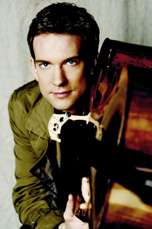|
Back
Double Dose of Dvorák Miami
New World Center
12/10/2011 -
Antonín Dvorák: Cello Concerto in B minor, Op. 104, B. 191 – Symphony No. 9 in E minor, "From the New World", Op. 95, B. 178
Johannes Moser (cello)
New World Symphony, Manfred Honeck (conductor)

J. Moser (© Manfred Esser/HänsslerClassic)
Dvorák is such a beloved composer that giving just one of his symphonies on a program usually guarantees a sell-out. New World Symphony went one better and gave a double bill of two of the master’s most popular pieces.
It began with the Cello Concerto. The first movement offers four minutes without the soloist during which the New World Symphony tears into Dvorák passion in a way that is rarely heard from musicians of a certain age. There is a freshness that can make even most dedicated audience members hear elements for the first time and be reminded of the excitement they felt upon that initial experience.
It helps tremendously when your soloist is Johannes Moser. Moser understands the piece thoroughly. During the second movement his dedication seems almost sacred as he toys with Dvorák’s sensitivity. Dvorák always played with sentimentality yet never went too far; Moser adamantly admires and values this. In the first and third, he attacks the power of the music as if he has completed a touchdown and feels the need to spike his bow. There are naturally a few missed notes and very brief moments when the orchestra overpowers him; this is not because Moser is reckless but is an excitingly dangerous musician. Yet this is not a take-no-prisoners performance. Moser plays for the team. His respect for conductor Manfred Honeck is evident and the necessary communication between the orchestra and its soloists is unusually moving. His dialogs with violinist Joshua Belvedere and the French horn of Patrick Hines are particularly memorable. This is a time when the overused word virtuoso is not overstating the performance. Of course, one must remember that this is Dvorák, so opportunities are rampant. The music always knows where it needs and wants to go. A greater test for Mr. Moser will come when he approaches a piece that is not as rich in emotion.
So, how do you follow up something this good. Dvorák’s Ninth is a great finale for a program but this work requires the virtuosity of all orchestra members if it is going to make an impression. Classical music radio listeners must hear this famous piece at least once a month, so seeing it listed on a schedule might not seem like a big deal; familiarity does breed contempt. On the other hand, we are hearing it with the New World Symphony at the New World Center. So even the playing of the triangle socks you in the gut. Until recognizing the percussionist, Jay Ganser, its clarity might make one assume that a cellphone has gone off. The acoustics in the hall are so fine that there are a multitude of sounds one might hear for the first time.
The famous second movement is what most people think of when the Symphony from the New World is mentioned. In a way it is like a concerto for the English horn. Karen Kistler does not create a new approach to show off her virtuosity. Instead she trusts that Dvorák did all the work and by just following his directions with honesty we are given a tour de force. Ms. Kistler is a prime example of what makes the New World Symphony such an important force in the future of classical music in America. And this precision in all sections of the orchestra is what continues to make it the thrilling ensemble it has remained since its modest beginnings nearly a quarter of a century ago.
And though New World does have a need to present the staples, there is plenty of repertory on its upcoming schedule that is not overly familiar. When an orchestra like New World attempts it, chances are unlikely that it will disappear quickly from anyone’s memory.
Jeff Haller
|